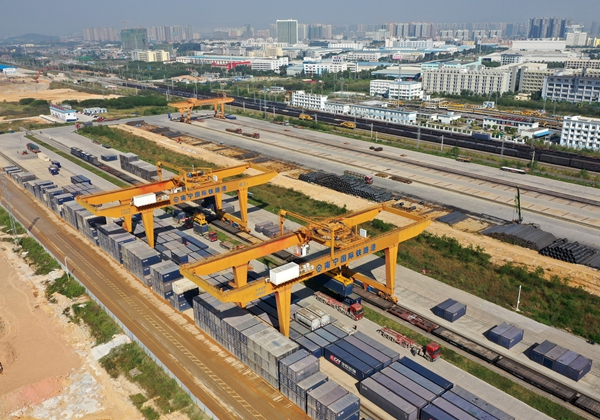RCEP opens a new chapter for Asian development
- By Tom Fowdy
 0 Comment(s)
0 Comment(s) Print
Print E-mail China.org.cn, November 18, 2020
E-mail China.org.cn, November 18, 2020

True prosperity and stability are only possible when countries come together to collectively integrate their economies and establish a uniform set of rules and standards, rather than actively seeking to beat each other through aggressive protectionism.
On Nov. 15, nations in the Asia-Pacific region took a huge step forward towards doing just that. Fifteen countries – China, Japan, South Korea, members of the Association of Southeast Asian Nations (ASEAN), Australia and New Zealand – came together to sign the Regional Comprehensive Economic Partnership (RCEP).
This creates a regional trading bloc covering over 30% of global GDP and 2.2 billion people. It is described as the "largest free trade agreement in history," eliminating most tariff barriers across participating states and creating a single set of rules.
The deal has subsequently been hailed as a milestone for regional integration and multilateralism in Asia, especially in a world where there is growing emphasis on protectionism, trade barriers and a switch to anti-globalization.
In line with this, it is a huge blow to the agenda set by President Donald Trump that leaves the U.S. outside of both major trading agreements in the region, and further questions the logic of Washington's attempt to "decouple" with China and isolate it from the global economy.
However, this is not a zero-sum game and what the agreement ultimately demonstrates is that integration and multilateralism is the only way forward to sustain growth.
Aggressive protectionism doesn't work, and contrary to the Trump administration's claims over the past four years, only serves to isolate rather than empower America.
Throughout his tenure, Trump has pushed the line that free and open trade is detrimental to American jobs, prosperity and industry, and under the auspices of "America First" he vowed to restore the country's industrial primacy through unleashing a series of belligerent trade wars against a number of parties, most specifically China.
By slapping tariffs on Chinese exports to the U.S., the president argued that it would force supply chains to return home and thus "kill two birds with one stone" in confronting Beijing. For the same reasons, the White House withdrew from the Trans-Pacific Partnership (TPP) deal.
As the anti-China rhetoric intensified, the idea of merely "rebalancing" trade for American preferences soon shaped into a broader narrative of decoupling and aggressive efforts by politicians such as Mike Pompeo to try and get other countries to cut ties with China.
However, the moves were strategically bizarre due to the fact they deliberately ignored and even treat contemptuously the idea that China is an integral part of the global economy and a driver of growth.
This created the scenario whereby Washington, under the auspices of unilateral protectionism, made demands on other countries, but offered very little incentives. The White House believed it could simply force other countries to align against Beijing under a binary of "freedom vs. Authoritarianism."
Washington misread the regional sentiment. Pompeo's attempts to drive wedges between other countries and China came to nothing. Far from wanting to take on Beijing, other countries recognized the realities of interdependence and thus espoused a cause directly opposed to Cold War politics – namely, economic integration.
ASEAN countries in particular have perceived integration is being in their own interests, seeking to consolidate new markets and align their economies. The signing of the RCEP teaches us, in turn, that there is no "zero-sum" game when it comes to participating in such agreements, because in an increasingly globalized world the logic of isolating oneself and "pulling up the drawbridge" is incompatible with growth.
Thus, the logic that there are always "winners" and "losers" in free trade is inherently misleading. In the meanwhile, the RCEP begins a new chapter, one which starts with a hope that in light of detrimental global trends caused by protectionism and the COVID-19, a more integrated Asia Pacific region will help the world to sustain momentum in economic growth.
Tom Fowdy is a British political and international relations analyst and a graduate of Durham and Oxford universities. He writes on topics pertaining to China, the DPRK, Britain and the U.S. For more information please visit:
http://www.china.org.cn/opinion/TomFowdy.htm
Opinion articles reflect the views of their authors, not necessarily those of China.org.cn.
If you would like to contribute, please contact us at opinion@china.org.cn.






Go to Forum >>0 Comment(s)